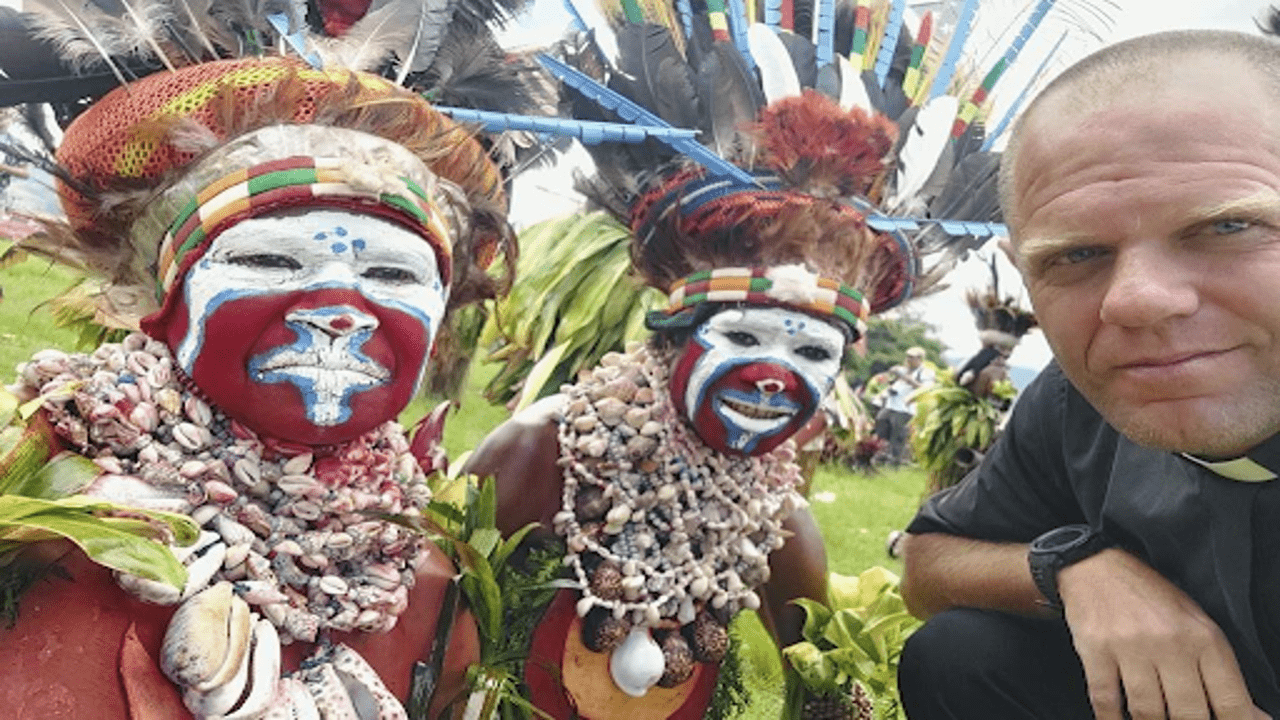
This undated photo from Fr. Tomas Ravaioli shows him with local villagers in Goroka, Papua New Guinea. (Fr. Tomas Ravaioli via AP)
Pope Francis is set to visit the Diocese of Vanimo in Papua New Guinea, a largely untouched area of the South Pacific island nation where Christianity is a relatively recent arrival. This visit, scheduled for September 8, will be a significant religious event in a region where Christian missionaries only began arriving in 1961.
Vanimo, located on the main island of New Guinea, is one of the most isolated and underserved regions in Papua New Guinea. The community of over 120,000 people often lacks basic modern amenities like running water, with electricity being a luxury for only a few who use solar panels or generators.
The Pope’s visit is noteworthy as it will see him engage with local Catholics who blend Christian beliefs with traditional spiritual practices. The diocese is a place where ancestral worship, animism, and sorcery continue alongside Christianity. During his visit, Francis will meet with missionary nuns and priests from Argentina, including a priest who has served in the region for 14 years due to a significant need for clergy.
Local priest Tomas Ravailoli, from the Institute of the Incarnate Word, has observed that while Christian churches are well-attended, many locals continue to hold onto indigenous customs that are sometimes at odds with Christian teachings. Despite this, he believes that Christianity is deeply rooted in Papua New Guinea.
The country is predominantly Christian, with 96% of its population identifying with the religion according to a 2000 census. However, traditional beliefs developed over 50,000 years are still influential. Michael Mel, a 65-year-old academic, highlights the importance of maintaining indigenous culture despite the influx of Western influences.
Issues such as tribal violence and accusations of witchcraft, known locally as sanguma, have also been problematic. These allegations often arise in response to deaths or illness and can lead to violence. Although the Sorcery Act, which previously allowed such accusations to partially justify murder, was repealed in 2013, violence against those accused of witchcraft remains an issue.
Conflicts over land ownership are another source of tension, as most land in Papua New Guinea is traditionally owned by tribes, leading to frequent territorial disputes. This has contributed to violence, such as the recent massacre in East Sepik province where armed attackers killed at least 26 villagers.
Despite these challenges, Bishop Francis Meli of Vanimo describes his diocese as “friendly and peaceful.” The upcoming papal visit is expected to bring significant attention to the region, with over 80 international media representatives planning to cover the event. Prime Minister James Marape has welcomed the visit, emphasizing the historical importance and the opportunity it presents for Papua New Guinea on the global stage.
The visit also comes at a time of heightened geopolitical interest in the South Pacific, with both the United States and China vying for influence in the region. The Vatican is simultaneously working to improve relations with China, aiming for a renewed agreement on appointing bishops in China.
The anticipation for Pope Francis’s visit is high, with locals expressing their excitement about this rare opportunity. Bishop Meli notes the historic nature of the visit and the joy it has brought to the local community, who view it as a once-in-a-lifetime event.















